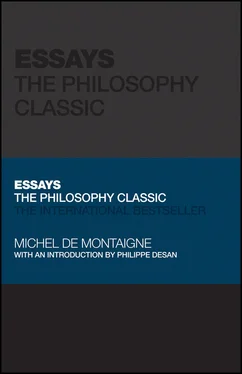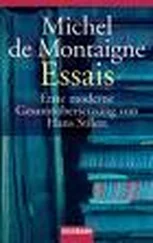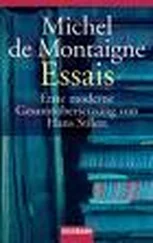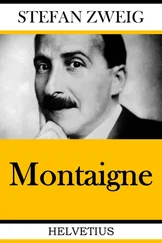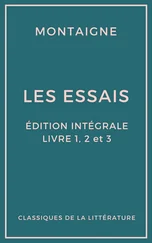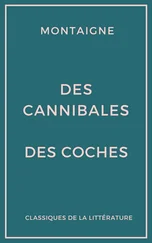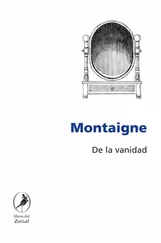Michel de Montaigne - Essays
Здесь есть возможность читать онлайн «Michel de Montaigne - Essays» — ознакомительный отрывок электронной книги совершенно бесплатно, а после прочтения отрывка купить полную версию. В некоторых случаях можно слушать аудио, скачать через торрент в формате fb2 и присутствует краткое содержание. Жанр: unrecognised, на английском языке. Описание произведения, (предисловие) а так же отзывы посетителей доступны на портале библиотеки ЛибКат.
- Название:Essays
- Автор:
- Жанр:
- Год:неизвестен
- ISBN:нет данных
- Рейтинг книги:3 / 5. Голосов: 1
-
Избранное:Добавить в избранное
- Отзывы:
-
Ваша оценка:
- 60
- 1
- 2
- 3
- 4
- 5
Essays: краткое содержание, описание и аннотация
Предлагаем к чтению аннотацию, описание, краткое содержание или предисловие (зависит от того, что написал сам автор книги «Essays»). Если вы не нашли необходимую информацию о книге — напишите в комментариях, мы постараемся отыскать её.
Essays: The Philosophy Classic
Essays: The Philosophy Classic
Essays — читать онлайн ознакомительный отрывок
Ниже представлен текст книги, разбитый по страницам. Система сохранения места последней прочитанной страницы, позволяет с удобством читать онлайн бесплатно книгу «Essays», без необходимости каждый раз заново искать на чём Вы остановились. Поставьте закладку, и сможете в любой момент перейти на страницу, на которой закончили чтение.
Интервал:
Закладка:
Quoties non modo ductores nostri, sed universi etiam exercitus,
ad non dubiam mortem concurrerunt?
[How often have not only our leaders, but whole armies, run to a certain and manifest death?”
— Cicero, Tusculum Disputations , i. 37.]
I have seen an intimate friend of mine run headlong upon death with a real affection, and that was rooted in his heart by divers plausible arguments which he would never permit me to dispossess him of, and upon the first honourable occasion that offered itself to him, precipitate himself into it, without any manner of visible reason, with an obstinate and ardent desire of dying. We have several examples in our own times of persons, even young children, who for fear of some little inconvenience have despatched themselves. And what shall we not fear, says one of the ancients [Seneca, Letters , 70.] to this purpose, if we dread that which cowardice itself has chosen for its refuge?
Should I here produce a long catalogue of those, of all sexes and conditions and sects, even in the most happy ages, who have either with great constancy looked death in the face, or voluntarily sought it, and sought it not only to avoid the evils of this life, but some purely to avoid the satiety of living, and others for the hope of a better condition elsewhere, I should never have done. The number is so infinite that in truth I should have a better bargain to reckon up those who have feared it. This one case therefore shall serve for all: Pyrrho the philosopher being one day in a boat in a very great tempest, showed to those around him who were terrified, the example of a hog that was not at all concerned at the storm. Shall we then dare to say that this advantage of reason, of which we so much boast, and upon the account of which we think ourselves masters and emperors over the rest of all creation, was given us for a torment? To what end serves the knowledge of things if it renders us more unmanly? If we thereby lose the tranquillity and repose we should enjoy without it? And if it put us into a worse condition than Pyrrho's hog? Shall we employ the understanding that was conferred upon us for our greatest good to our own ruin; setting ourselves against the design of nature and the universal order of things, which intend that everyone should make use of the faculties, members, and means he has to his own best advantage?
But it may be objected: Your rule is true enough as to what concerns death; but what will you say of indigence? What will you, moreover, say of pain, which Aristippus, Hieronymus, and most of the sages have reputed the worst of evils; and those who have denied it by word of mouth have, however, confessed it in effect? Posidonius being extremely tormented with a sharp and painful disease, Pompeius came to visit him, excusing himself that he had taken so unseasonable a time to come to hear him discourse of philosophy. “The gods forbid,” said Posidonius to him, “that pain should ever have the power to hinder me from talking,” and thereupon fell immediately upon a discourse of the contempt of pain: but, in the meantime, his own infirmity was playing his part, and plagued him to purpose; to which he cried out, “You may work your will, pain, and torment me with all your power, but you shall never make me say that you are evil.” This story makes a fuss, but what has it to do with the contempt of pain? He only fights it with words, and in the meantime, if the shootings pains he felt did not move him, why did he interrupt his discourse? Why did he fancy he did so great a thing in forbearing to confess it an evil? All does not here consist in the imagination; our fancies may work upon other things: but here is the certain science that is playing its part, of which our senses themselves are judges:
Qui nisi sunt veri, ratio quoque falsa sit omnis.
[Which, if they be not true, all reasoning may also be false.
—Lucretius, iv. 486.]
Shall we persuade our skins that the jerks of a whip agreeably tickle us, or our taste that a potion of aloes is vin de Graves? Pyrrho's hog is here in the same predicament with us; he is not afraid of death, it is true, but if you beat him he will cry out to some purpose. Shall we force the general law of nature, which in every living creature under heaven is seen to tremble under pain? The very trees seem to groan under the blows they receive. Death is only felt by reason, forasmuch as it is the motion of an instant;
Aut fuit, aut veniet; nihil est praesentis in illa.
[Death has been, or will come: there is nothing of the present in it.
—Estienne de la Boétie, Satires .]
Morsque minus poenae, quam mora mortis, habet.
[The delay of death is more painful than death itself.
—Ovid, Epistles . Ariadne to Theseus, v. 42.]
A thousand beasts, a thousand men, are sooner dead than threatened. That also which we principally pretend to fear in death is pain, its ordinary forerunner: yet, if we may believe a holy father:
Malam mortem non facit, nisi quod sequitur mortem.
[It is only which follows death what makes death bad.
—St. Augustine, City of God , i. ii.]
And I should yet say, more probably, that neither that which goes before nor that which follows after is at all of the appurtenances of death.
We excuse ourselves falsely: and I find by experience that it is rather the impatience of the imagination of death that makes us impatient of pain, and that we find it doubly grievous as it threatens us with death. But reason accusing our cowardice for fearing a thing so sudden, so inevitable, and so insensible, we take the other as the more excusable pretence. All ills that carry no other danger along with them but simply the evils themselves, we treat as things of no danger: the toothache or the gout, painful as they are, yet being not reputed mortal, who reckons them in the catalogue of diseases?
But let us presuppose that in death we principally regard the pain; as also there is nothing to be feared in poverty but the miseries it brings along with it of thirst, hunger, cold, heat, watching, and the other inconveniences it makes us suffer, still we have nothing to do with anything but pain. I will grant, and very willingly, that it is the worst incident of our being (for I am the man upon earth who the most hates and avoids it, considering that hitherto, I thank God, I have had so little traffic with it), but still it is in us, if not to annihilate, at least to lessen it by patience; and though the body and the reason should mutiny, to maintain the soul, nevertheless, in good condition. Were it not so, who had ever given reputation to virtue; valour, force, magnanimity, and resolution? where were their parts to be played if there were no pain to be defied?
Avida est periculi virtus.
[Courage is greedy of danger.
— Seneca, De Providentia, c. 4]
Were there no lying upon the hard ground, no enduring, armed at all points, the meridional heats, no feeding upon the flesh of horses and asses, no seeing a man's self hacked and hewed to pieces, no suffering a bullet to be pulled out from amongst the shattered bones, no sewing up, cauterising and searching of wounds, by what means were the advantage we covet to have over the vulgar to be acquired? It is not fleeting evil and pain, the sages say, that a man should most covet, but to perform acts which bring us the greater labour and pain.
Non est enim hilaritate, neclascivia, nec risu, aut joco
comite levitatis, sed saepe etiam tristes firmitate et
constantia sunt beati.
[For men are not only happy by mirth and wantonness, by laughter and jesting, the companion of levity, but ofttimes the serious sort reap felicity from their firmness and constancy.
Читать дальшеИнтервал:
Закладка:
Похожие книги на «Essays»
Представляем Вашему вниманию похожие книги на «Essays» списком для выбора. Мы отобрали схожую по названию и смыслу литературу в надежде предоставить читателям больше вариантов отыскать новые, интересные, ещё непрочитанные произведения.
Обсуждение, отзывы о книге «Essays» и просто собственные мнения читателей. Оставьте ваши комментарии, напишите, что Вы думаете о произведении, его смысле или главных героях. Укажите что конкретно понравилось, а что нет, и почему Вы так считаете.
